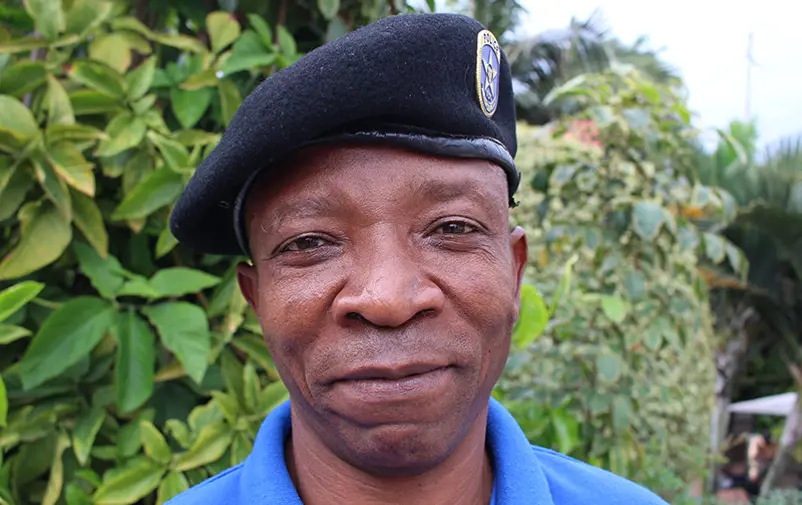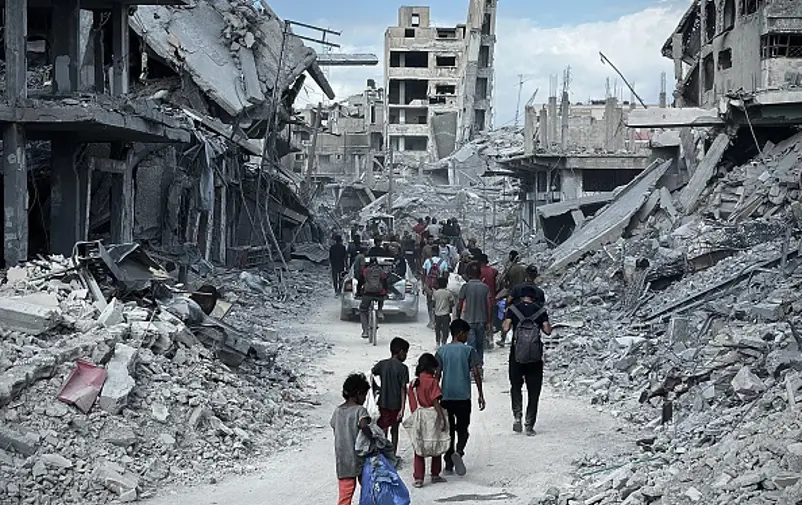Police officer Innocent Rutema Baguma works for gender equality in eastern DR Congo
Innocent Rutema Baguma works as a police officer in eastern Democratic Republic of the Congo. Since the start of his police career in 2004, he has taken several initiatives for increased gender equality within the police force. Today, he is an active member of the FBA-supported Inclusive Peacebuilding Network (RCPI), working for change at home, within the police and in society at large.As successive conflicts have wracked eastern DR Congo, Congolese women and men, girls and boys, have over the last decades suffered from the brutality of their effects.
Faced by this surge in violence, Innocent Rutema Baguma decided to act, joining the police, and later the unit charged with the protection of children and the prevention of sexual violence. Baguma has witnessed first-hand the grim realities faced by many women and girls in the province, as well as the urgent need to change mindsets when it comes to questions of gender equality.
In 2017 Innocent Baguma became one of the first participants in FBA’s training on gender mainstreaming in DRC and is now an active member of the Inclusive Peacebuilding Network (RCPI), which is supported by FBA, and brings together women and men from a range of state and non-state actors - everything from civil society, to the judiciary.
The network provides an important platform to share experiences and explore opportunities to integrate a gender perspective in organizations, institutions and political processes that can contribute to sustainable peace in one of the world’s most conflict-affected regions.
Innocent Baguma now uses his deepened understanding of gender mainstreaming to push for change, at home, within the police force, and in society at large.
How did you first find yourself working on issues around gender equality?
– I was a teacher before, but after the so-called War of Liberation (1996-97, which led to the fall of President Mobutu Sese Seko) I joined the newly established police force to help the local population.
– In the wars that followed, there were so many cases of sexual violence, here in South Kivu, and it really hit me, the reality of it. When I saw the violence reaching such a high level, I said ‘no, I must do something to fight against this phenomenon’. That was in 2004 when I joined the unit for the protection of children and the prevention of sexual violence.
– Then in 2017 I was selected to participate in a year-long training provided by FBA, and after that the network was created, the Network for Inclusive Peacebuilding (RCPI). That’s how I find myself here, and up to now I am still the only police officer in the network!
What have been the impacts of the training and the network?
– It was after my training from FBA that I changed my attitude: in my personal life, at work, within the community, there has been a big change.
– In my family there have been changes, because when I learnt about gender equality, and the use of gender analysis, I found that there were things happening in my own family that I had been ignoring, bad practices you could say, against women and girls, which I was connected to, despite my role within the police.
– At work I launched an initiative to make changes in my unit. I tried to bring men and women within my unit together, getting men to do work which had previously been done only by the women, to get rid of this idea that there are certain menial tasks which are only women’s work. They got used to this over time.
– Then, in terms of the organization of my unit, I also made changes. There were a lot of women who were marginalized, who were not considered for specific jobs, but I tackled this strategy, I spoke to my boss at the time about what we were trying to do after the FBA training, who understood straight away, and was involved from that moment in what we were trying to do. From then on, when I suggested qualified women for specific positions, he did not hesitate, he accepted. Since then, we have seen women in positions of authority, and that is a change.
Can these changes continue to spread through the rest of the police service?
– That is our objective. And as the authorities now understand and engage in the fight against this inequality that shows we’re heading in the right direction and we can go far. Because myself, I started through my position as head of the unit for the prevention of sexual violence, in the hope that these ideas will spread to other units, that’s our objective, that’s our perspective for the future.
How can we together tackle the problem of sexual violence in DR Congo?
– It is an enormous question, which requires many responses, but in brief, to fight against sexual violence effectively, we must always reinforce mechanisms to raise awareness, to teach people - I’m talking about my own service, the police - we must inform people about the rights of women, the rights of girls, and teach them about the fight against this type of violence.
– Then, we also need to reinforce the justice system: if we have real justice, we will banish impunity, and if we get rid of impunity, we’ll see sexual violence start to disappear.
– We must start with prevention, which requires training and education, but also the repression, to punish those who are perpetrators.
What role can the RCPI network play in promoting a more inclusive society in eastern DR Congo, where there is equality between women and men?
– The role of the network is clear. We have been working together since 2017, and the network keeps us connected. When we meet it facilitates the chance to talk and to learn. It helps us a lot. Each of us has our expertise, and when we come together to share ideas, it helps us to see what we need to do today - and in the future - to continue the fight.








 >
> >
>

